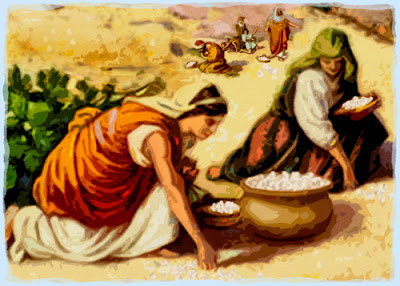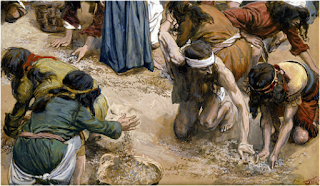 |
"The Gathering of the Manna"
by James Tissot 1896-1900
|
TODAY’S SPECIAL: Joshua 5-8; Psalm 66
TO CHEW ON: “Then the manna ceased on the day after they had eaten the produce of the land; and the children of Israel no longer had manna but they ate the food of the land of Canaan that year.” Joshua 5:12
Imagine that first morning of going out to collect manna as usual and finding – none! What God had provided every morning six days a week for forty years stopped as suddenly as it started. I can just see the people looking all around them puzzled, scanning the more distant terrain, and someone asking, “What day is today?” thinking perhaps it was Sabbath after all.
Change. It comes to us all. I wonder if the Israelites welcomed this one. No doubt some of them did, for they had had their moments of complaining about their one-item menu in the past. I’m sure, though, that others looked back on the manna years as the good old days, spoke fondly of their mother’s ingenuity in preparing it and sometimes hankered after just one more taste.
There was one constant in this, though. The One behind the provision was still God. Before He withheld the manna, He made sure there was something to take its place.
Has your current supply of manna stopped? Perhaps you’ve lost your job, or a big client hasn’t renewed a contract. You’re wondering, how will my needs be met?
This is a good time to remember your source. It’s not your boss, or your client, or the company, but God. The God who owns the cattle on a thousand hills - who has promised to supply all your need according to His riches . Of course life after your current ‘manna’ may not be quite the same. Your new provision may demand a different kind of effort or a new level of responsibility. Still, God promises to supply what you need.
PRAYER: Dear God, thank You for Your presence in my life and for Your provision for me in many ways. Help me to have the flexibility to change when that is required.
PSALM TO PRAY: Psalm 66
*************
Unless otherwise noted all Scripture quotations are taken from the New King James Version®. Copyright © 1982 by Thomas Nelson, Inc. Used by permission. All rights reserved.
.jpg)



